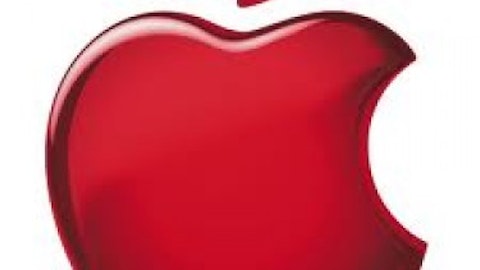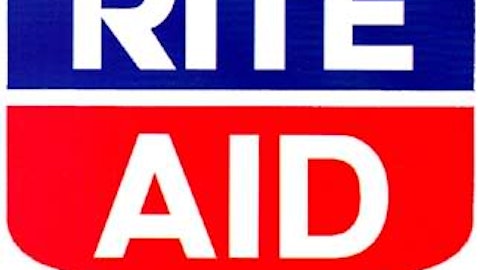Exide filed for bankruptcy protection after efforts to restructure following the loss of Wal-Mart Stores, Inc. (NYSE:WMT) as a customer didn’t pan out. The largest retailer in the world is a big customers for a lot of companies, which is why it’s a good idea to see who else could feel the sting of losing Wal-Mart Stores, Inc. (NYSE:WMT).

The 800 lb Gorilla
Wal-Mart is a giant in the retail space. It sells everything from food to clothing, and is a major customer for most product manufacturers. That’s part of the reason why it can be so aggressive when requesting price concessions. Its suppliers, some of which derive 30% or more of their top lines from the retailer, simply can’t say no because they can’t afford the risk of losing Wal-Mart’s business.
That’s a bigger deal than many think. For example, Exide, a battery maker, lost Wal-Mart in 2010 and had to start restructuring its business. It couldn’t remain afloat after suffering a manufacturing setback earlier this year. While it took the second blow to push the company over the edge and into bankruptcy, losing Wal-Mart Stores, Inc. (NYSE:WMT)’s business was the obvious precipitant.
Who Else?
Exide had a focused product line without material brand differentiation, so it was notably exposed to losing a large customer. There are some companies that rely heavily on Wal-Mart as a customer that are at less risk of such an event. For example, Wal-Mart accounted for about a quarter of The J.M. Smucker Company (NYSE:SJM)’s top line in 2012.
That’s a huge number, but it is less daunting than it might seem. While the company’s products are all centered around its jelly and jams in some way, they are differentiated by their brand name. That’s an important quality. Moreover, they are relatively low cost and consumable items that sell frequently. Wal-Mart Stores, Inc. (NYSE:WMT) couldn’t as easily replace The J.M. Smucker Company (NYSE:SJM)’s.
The company’s top and bottom lines have grown fairly steadily over the past decade, as has its dividend. Yielding around 2%, the shares are a decent option for growth-minded investors. Although watching The J.M. Smucker Company (NYSE:SJM)’s relationship with Wal-Mart is important, it shouldn’t be a major concern.
No Differentiation
Cott Corporation (USA) (NYSE:COT), on the other hand, doesn’t have a brand to call its own. The company is one of the largest private label manufacturers of soda and other beverages. Wal-Mart Stores, Inc. (NYSE:WMT) could replace Cott with a competitor and customers would never know the difference because the brand wouldn’t change, just the manufacturer.
Wal-Mart accounted for 31% of Cott Corporation (USA) (NYSE:COT)’s top line in 2012. The company had revenues of $2.25 billion that year, which means that the loss of Wal-Mart would pull that down to $1.55 billion virtually overnight. However, Cott Corporation (USA) (NYSE:COT) would still have to maintain all of its factories, at least until they could be sold. Staff costs are pretty much the only place it could quickly cut back. Red ink would quickly follow the loss of Wal-Mart Stores, Inc. (NYSE:WMT).
Cott’s business was weak through the 2007-2009 recession, but has picked up since. That said, the shares have traversed a seesaw path historically. Although a recently initiated dividend leaves the shares yielding around 2.9%, investors would be better served buying industry giants PepsiCo, Inc. (NYSE:PEP) and The Coca-Cola Company (NYSE:KO). Both yield only a touch less and have much stronger businesses and brand portfolios.
A Service Issue
Another company that is heavily reliant on Wal-Mart is Moneygram International Inc (NASDAQ:MGI). Moneygram International Inc (NASDAQ:MGI) is one of the largest money transfer firms in the world. It is, however, a service provider that pretty much does only one thing. So, Wal-Mart has invited the company into its stores and could just as easily ask it to leave.
Industry giant Western Union is the obvious replacement option, but there are smaller upstarts, too, that are changing the money transfer space, like Xoom. Xoom has built on an online model which could easily, and probably more cheaply, offer the same money transfer service as Moneygram International Inc (NASDAQ:MGI) in a Wal-Mart Stores, Inc. (NYSE:WMT) store.
Wal-Mart accounted for 28% of MoneyGram’s fee revenue in 2012. That makes the company very reliant on Wal-Mart in a highly competitive industry. The money transfer company is making important changes to its business and has shifted back into growth mode after faltering badly during the recession. That makes it an interesting turnaround play, particularly as it has offices in growing markets around the world. However, investors need to carefully monitor the Wal-Mart relationship.
No Two are Alike
No two companies are alike, so just counting Wal-Mart as a big customers isn’t enough to set off alarm bells. However, the risk increases materially for companies that sell undifferentiated products or that offer only one product or service. MoneyGram and Cott investors should be paying close attention to Wal-Mart Stores, Inc. (NYSE:WMT)’s business.
The article Will Losing This Retail Giant Push Your Investments Into Bankruptcy? originally appeared on Fool.com and is written by Reuben Brewer.
Reuben Brewer has no position in any stocks mentioned. The Motley Fool has no position in any of the stocks mentioned. Reuben is a member of The Motley Fool Blog Network — entries represent the personal opinion of the blogger and are not formally edited.
Copyright © 1995 – 2013 The Motley Fool, LLC. All rights reserved. The Motley Fool has a disclosure policy.




